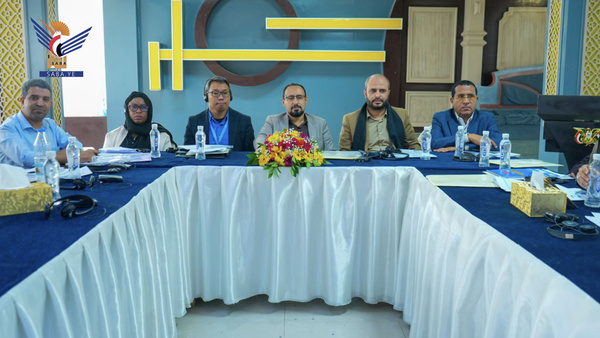Sana’a - Saba:
A workshop held in Sana’a, organized on Tuesday by the International Cooperation Sector of the Ministry of Foreign Affairs and Expatriates, reviewed the plans of government entities funded by the United Nations Children’s Fund (UNICEF) for the years 2025-2026.
The workshop, attended by representatives from various ministries and government institutions, a UNICEF delegation, and a number of technical experts, aimed to enhance institutional coordination and participatory planning between the government and UNICEF. This was achieved by reviewing previous programs, presenting upcoming funding plans, identifying challenges, and formulating practical recommendations to improve performance.
In his opening remarks, Ambassador Ismail Al-Mutawakel, Deputy Foreign Minister for International Cooperation, described the workshop as a strategic turning point in the partnership with UNICEF, paving the way for a new phase of cooperation based on effectiveness and transparency.
He emphasized that the meeting serves as a platform for collective thinking and joint future planning, expressing hope that the workshop’s outcomes would result in a unified vision aligned with current priorities, grounded in a scientific and systematic evaluation of past achievements.
Ambassador Al-Mutawakel highlighted the Foreign Ministry’s commitment to strengthening formal coordination through the International Cooperation Sector with international organizations to ensure program alignment with national policies and avoid duplication. He also stressed the importance of establishing a joint monitoring and evaluation mechanism.
He underscored the need to boost donor confidence by adhering to transparency standards, improving government performance efficiency, and fostering teamwork with international partners, while acknowledging UNICEF’s role and the technical support it provides across various sectors.
For his part, Mioh Nemoto, Deputy Resident Representative of UNICEF in Yemen, expressed appreciation for the ongoing cooperation with the Ministry of Foreign Affairs and relevant ministries, describing the workshop as a crucial opportunity to enhance partnership outcomes in service of Yemeni children.
He pointed to Yemen’s escalating humanitarian challenges, including malnutrition, disease outbreaks, and deteriorating basic service infrastructure, noting that half of Yemen’s children suffer from stunting, while millions lack access to education and clean water.
Nemoto stated that UNICEF’s current response focuses on three key priorities: sustaining primary healthcare services, treating acute malnutrition cases, and providing cash assistance to the most vulnerable families.
He stressed that the success of humanitarian interventions depends on enhancing transparency, facilitating access to affected areas, and ensuring the safety of field teams, calling for improved joint mechanisms to achieve tangible results.
Meanwhile, Murtada Al-Murtada, Director-General of the Technical Cooperation Office at the Ministry of Health and Environment, presented an analytical overview of UNICEF’s interventions in the health sector. These included supporting primary healthcare facilities, improving obstetric care services, immunization against infectious diseases, distributing treatments for acute diarrhea, training community health workers, and strengthening vaccine cold chain systems.
Abdulrahman Al-Araby, Director of Strategic Planning at the Ministry of Education and Scientific Research, outlined the ministry’s upcoming priorities, such as rehabilitating damaged schools, providing water and energy services, and constructing new schools in densely populated areas.
He affirmed the ministry’s efforts to increase school enrollment by supporting underprivileged students, reducing dropout rates, and training educational staff. Additionally, he highlighted plans to activate technical and vocational education, strengthen community partnerships in education management, and update curricula and training programs to meet labor market demands.

| more of (Local) |




